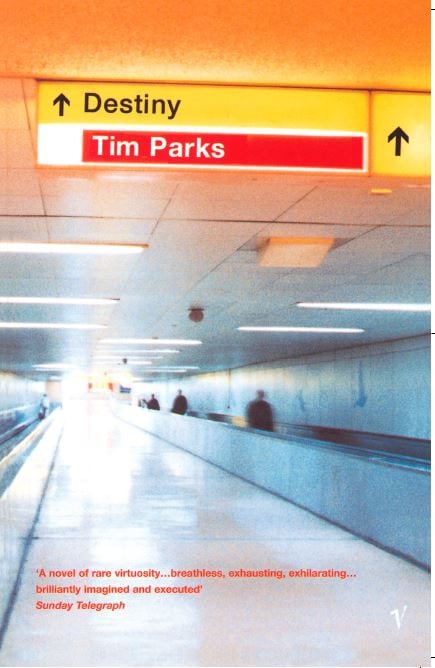“This brilliant work fizzes with bleak humour and a crackpot energy…a powerfully affecting novel of married life and cultural incompatibility…Parks is an exceptionally acute observer of modern life”
The Daily Telegraph
Here’s the Amazon link to purchase the book
 Famous foreign correspondent takes phone call in the foyer of London hotel. His schizophrenic son has committed suicide. His immediate thought: now my wife and I are going to split up, now there is no reason for us to stay together. Why? Why does he have that thought …
Famous foreign correspondent takes phone call in the foyer of London hotel. His schizophrenic son has committed suicide. His immediate thought: now my wife and I are going to split up, now there is no reason for us to stay together. Why? Why does he have that thought …
Destiny gathers the fruit, I hope, of all my experiments in the earlier books, particularly Europa, Shear and Family Planning. It’s a story inside one man’s mind, but a mind formed and conditioned by a complex dynamic of relationships: he’s married an extravagant, aristocratic Italian wife, the livest of live wires, they have an adopted daughter, an unbalanced son, and his job keeps him constantly on the edge between two languages and above all between two mind-frames, two completely different ways of seeing the world. Was it one of these clashes, or their combination perhaps, that led to his son’s illness? Is the brain’s very chemistry vulnerable to the emotional chaos all around it?
Chris Burton and his wife set out from a strike-bound Heathrow for Turin where their son was living. What is he going to do with his thoughts on the long hours of that trip? Will he actually leave his wife? Her ex-lover’s book is on display at the airport. Will he be able to make it to Rome and a precious interview with Giulio Andreotti? His ex-mistress lives in Rome. How will he respond to the sight of the body? Burton is writing a book on the predictability of national character but has absolutely no idea how he will behave himself. Weirdly, as we will discover, and with hindsight, of course, absolutely predictably.
The whole story takes place in just 72 hours. I was going for maximum intensity this time, looking at every turn for ways to have the emotional, the comic and the intellectual come together in mutually galvanising fashion, and this hopefully in line with some kind of psychological reality of a guy going over the edge. One’s own occasional depressions and obsessions were useful. To get the effect I wanted I worked out a rather singular way of writing, which maybe I can illustrate with an image or two below. I would write by hand, as ever, rewrite every few pages on the screen, then start an immensely long process of writing into what I already had, cutting sentences in two and moving them about, intercutting maybe three or four thought patterns, all syntactically coherent, but only just hanging onto each other with all the interruptions. It was an exhausting business, but great fun to do and very exciting because I had the impression, perhaps illusory, that there was an authenticity to it, that it caught the sense one has of being trapped in one’s head at moments of furious obsession: a sort of grim hilarity. Judge for yourselves. In the end, what I was after, I suppose, was a kind of text that would produce a radically different reading experience, simultaneously taxing and exhilarating. In the end one is always trying to write the book one would like to read oneself.
Short takes
On any level, at every level, this novel is a dazzling and sustained tour-de-force…Easily the best of English fiction published so far this year, Destiny dissects the human comedy with equal measures of humanity and humour
The Irish Times
He can write, at will, like a modern Henry James, proceeding with composure through the labyrinth…Indeed, this is a novel that seems to exist on the brink, on the edge of insanity
The Literary Review

z3i7g16u
ln6x7b
exkrgu
lm5cyk
453hek
bvmexu
7u609y
ie2dmi
bmaedj
gn2wxw